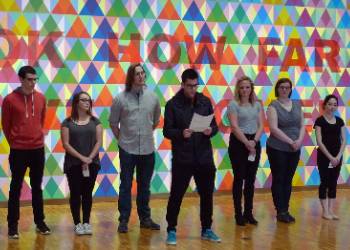101 TuTh 3:30-4:45 Professor Jackielee Derks
Course Title: Books that Matter: Distant Connections
Course Description: Despite the many ways that technology promises to keep us connected, the global pandemic forced us to endure extreme isolation. As lockdowns and social distancing became our new normal, many of us longed to reconnect with loved ones and friends in more authentic ways. In this class, we’ll study novels and short stories from around the world to discover what it means to be connected. As we read, we’ll explore novels made up of interconnected short stories and characters that defy the boundaries of time and space to make unexpected connections. We’ll investigate how stories help us transcend borders to connect with others in meaningful ways. And, we’ll use our own experiences to consider how the practice of storytelling can help us achieve similar connections in our own lives.
Readings: Ruth Ozeki, A Tale for the Time Being; Colum McCann, Let the Great World Spin; Zeyn Joukhadar, The Map of Salt and Stars; Tommy Orange, There There; and selected short stories from Helen Oyeyemi.
Assignments: Short writing assignments; participation in story exchanges; and a reading journal
102 TuTh 9:30-10:45 Professor Matthew Burchanoski
Course Title: Life During Globalism
Course Description: While modernist and postmodernist literature have their share of wide-ranging, expansive epics, the 21st century has featured a rapid expansion of fiction traversing time, place, and genre in search of a globally unifying structure. One of the works most emblematic of this trend is David Mitchell’s 2004 novel Cloud Atlas. Ranging across six different eras and locations, each written in a unique genre, Cloud Atlas culminates with a message of inescapable connection, which could be read as a depressing or beautiful ending to a novel warning of future cataclysm.
In this course we’ll investigate Cloud Atlas as a representative novel, structurally and thematically, of how contemporary fiction writers are grappling with the pressures, lures, and dangers of, in particular, globalism and cosmopolitanism. We’ll begin with select theoretical readings that analyze the anxieties surrounding 21st century periodization and the ethics of an electronically, economically, and physically globalized world. We’ll use Cloud Atlas as a lens to discuss questions of periodization, decolonization, global capitalism, the compatibility of art and science, posthumanism, ecocriticism, and more. Along with reading Cloud Atlas and watching the Wachowski’s film adaptation from 2012, we’ll read selections from other 21st century authors to get a fuller sense of how writers are imagining our contemporary history and the obstacles to an ethical cosmopolitanism.
Additional short works could include, but is not limited to, those by Michael Ondaatje, Zadie Smith, Karen Joy Fowler, Samantha Schweblin, Colson Whitehead, Emily St. John Mandel, J.M. Coetzee, and/or Laurent Binet. as well as selections from other genres, primarily music and television/film.
Assignments: Online discussion posts, presentations, short writing assignments, one final project.
103 MWF 8:00-8:50 Professor John Brick
Course Title: (Non)fiction
Course Description: Are fiction and nonfiction really the opposites that we often casually assume them to be? Reader, they are not — and in this section of English 2011, we’re going to spend digging around in texts that live in the gray area between these two apparently contradictory poles of literature. This course leans into the smorgasboard of genres, the buffet of styles, the sampler platter of authors, all tied together by their common playfulness in — and clever manipulation of — the spaces between fiction and nonfiction, subjectivity and objectivity, representation and fabrication. Our readings will take us into issues like mass surveillance and data harvesting, climate and environment, and journalistic reliability (and more!); across a range of authors from Martha Gellhorn, Ursula K. Le Guin, Anthony Bourdain, and Joan Didion to Junot Díaz, Ellen Raskin, Edward Abbey, Vertamae Smart-Grosvenor, and Hunter S. Thompson (and beyond!); through a wide and intersecting range of genres and styles: the young-adult detective novel, the short character sketch, narrative journalism, war dispatches, science fiction meditations, nature-writing memoir (and … well, you get the idea). This class is ideal for students keen to actively engage with a wide variety of literature and to closely and critically examine how fiction, nonfiction — and especially the spaces in between — provide authors with the tools to work within their historical and cultural contexts and code their ideas into compelling forms. Course assignments include semi-formal (read: low-stress) presentations that lead class discussion and short written assignments that engage intelligently and creatively with the ideas and forms of our texts. For their culminating assignment at the end of the semester, students will be able to choose their projects from a number of options calculated to suit their scholarly interests and goals.



